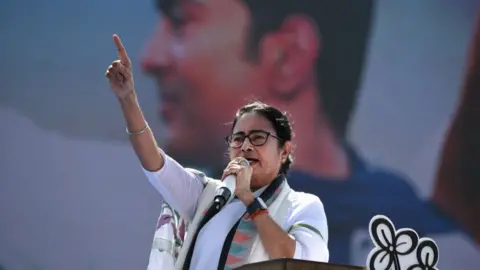 संबाददाता
संबाददाता

How fair is the electoral landscape in India’s general election?
Not very, says the opposition alliance. It accuses the Narendra Modi-led Bharatiya Janata Party (BJP) government of denying it a level playing-field.
The BJP, seeking a third consecutive term, is ahead in opinion polls, and the opposition, which has been short of vote-winning national leaders in recent years, appears to have much ground to make up.
Formed last July and made up of the main opposition Congress and smaller and regional parties, the coalition named itself INDIA, an acronym for Indian National Developmental Inclusive Alliance. Its more than two dozen members are an unlikely, unwieldy grouping brought together by their desire to unseat the BJP.
The opposition alleges the government is using its investigative agencies and financial influence to gain the upper hand. Mr Modi dismisses such claims as mere “excuses”.
Fuelling these accusations are recent arrests of key opposition figures, such as Delhi Chief Minister Arvind Kejriwal and former chief minister Hemant Soren of Jharkhand State on corruption charges they say are baseless and politically motivated.
Mr Kejriwal, one of the government’s fiercest critics, was taken into custody a month before the election began, depriving the opposition alliance of one of its most prominent and popular campaigners.
Since the BJP came to power a decade ago, more than 100 politicians have been investigated by India’s federal agencies – 95% of them from the opposition, the Indian Express reports. The paper finds that many later switched allegiance to the BJP. Of 25 opposition leaders under investigation for corruption who did so, 23 saw cases against them dropped or put on hold, it reports.
 Getty Images
Getty ImagesThat’s not all. In February, Congress leaders alleged that the party’s bank accounts had been frozen and accused Mr Modi’s government of using the tax department to starve them of finances ahead of the elections. The tax department denied the claims.
In December more than 140 federal opposition lawmakers were briefly suspended from parliament during protests over a security breach.
The same month, Mahua Moitra, an opposition MP and Modi critic, was expelled from parliament after being accused of taking bribes in exchange for asking questions. Ms Moitra, who has denied the allegations, said she had been expelled “without proof” and is standing for re-election in West Bengal state.
Last summer Congress leader Rahul Gandhi was disqualified as a lawmaker for three months in a criminal defamation case. The courts stayed his conviction on appeal.
“The idea that India is the world’s largest democracy is a… complete lie,” Mr Gandhi told journalists in March at a news conference to publicise the party’s frozen bank accounts. The BJP responded, saying the Congress top leadership feared “a historic defeat” and therefore “ranted against Indian democracy and institutions”.
Rights group Amnesty International said the “crackdown” on the opposition had reached a “crisis point” ahead of the general election.
Journalist and author Neerja Chowdhury questioned the fairness of freezing the Congress’s bank account and arresting Mr Kejriwal on the eve of the election.
“It does give the impression that you are less than fair. There is a feeling or a question among people, including BJP supporters: is this getting too much? It will be interesting to see how this would manifest in the polls,” she said.
प्रतिक्रिया